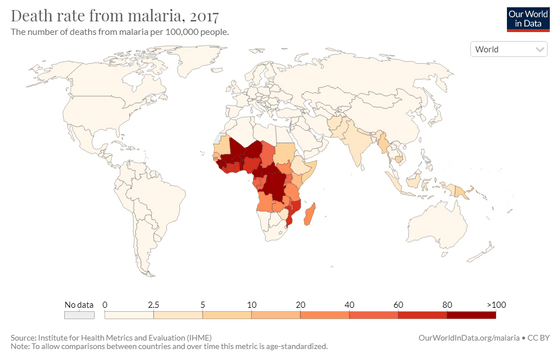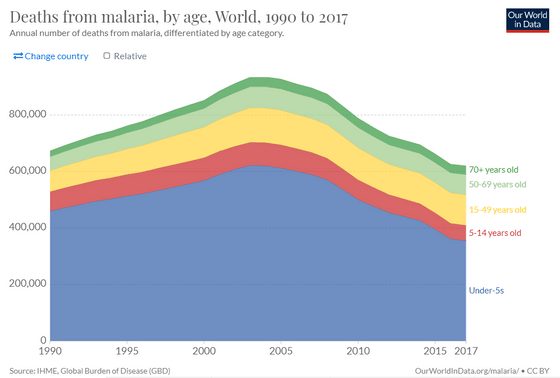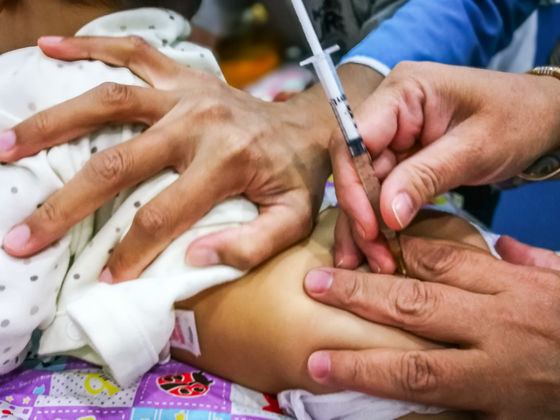Oxford University develops '77% effective malaria vaccine', the most effective malaria vaccine ever

by
On April 23, 2021, Oxford University in the United Kingdom announced that it was confirmed to be 77% effective in a clinical trial of 'R21 / Matrix-M ', which is being studied as a candidate for malaria vaccine. Since this vaccine is the first vaccine to meet the 'minimum 75%' set by the World Health Organization (WHO) as an efficacy target for malaria vaccines, it is expected that global malaria control efforts will make great strides. ..
Malaria vaccine becomes first to achieve WHO-specified 75% efficacy goal | University of Oxford
https://www.ox.ac.uk/news/2021-04-23-malaria-vaccine-becomes-first-achieve-who-specified-75-efficacy-goal
Malaria is an infectious disease that causes symptoms such as fever and headache when infected with the parasite Plasmodium malaria, and in the worst case, it is fatal. It is estimated that 405,000 people worldwide died from malaria in 2018.
Below is a color-coded map of the number of malaria deaths per 100,000 population in 2017, created by Our World in Data , a global survey of poverty and illness. Malaria is transmitted by tropical mosquitoes, so dark areas that indicate high death toll are concentrated in Africa and South Asia.

by
Although the annual number of deaths from malaria in Japan is zero, the Ministry of the Environment said, 'As long as the current social and hygienic conditions are maintained, it is unlikely that dengue fever, malaria, etc. will actually re-emerge. is. However, when viewed from the biological point of view, habitat expansion of the vector mosquitoes is certain, potential risks associated with global warming is considered to be large, 'said (PDF file) it says .
Below is a graph of the number of malaria deaths from 1990 to 2017 by age group. The most common blue layer is under 5 years old, indicating that the overwhelming majority of newborn children are sacrificed.

by
To stop the damage caused by malaria, Oxford University, Novavax pharmaceutical company, Serum Institute of India (SII) and others have developed and manufactured the malaria vaccine 'R21 / Matrix-M' and conducted clinical trials to confirm its effectiveness. Did.
The clinical trial was conducted in Burkina Faso , West Africa, in 450 children aged 5 to 17 months. Participants were divided into three groups: a group that received the 'R21 / Matrix-M' adjuvant at high and low doses, and a group that received the rabies vaccine as a control group.
Follow-up studies conducted 12 months after administration confirmed that the vaccine was effective in 77% of the high-dose group and 71% of the low-dose group, with serious adverse events. It was not confirmed.

'Clinical trials support the expectation that our vaccine may have reached the WHO's target of at least 75% efficacy for the first time,' said Adrian Hill, director of the Jenner Institute at Oxford University, co-author of the paper. If the vaccine is approved, it will be in public health, as commercial partner SII has promised to produce at least 200 million doses of the vaccine annually within the next few years. It can have a big impact. '
Since the annual number of cases of malaria is 228 million as of 2018, if the production and distribution of `` R21 / Matrix-M'' is carried out in earnest, it is at risk of malaria. Most people will be able to get vaccinated.
A research team from Oxford University and others will conduct a larger clinical trial of 4,800 children aged 5 to 36 months in four African countries to investigate the safety and efficacy of the vaccine.
Related Posts:
in Science, Posted by log1l_ks






